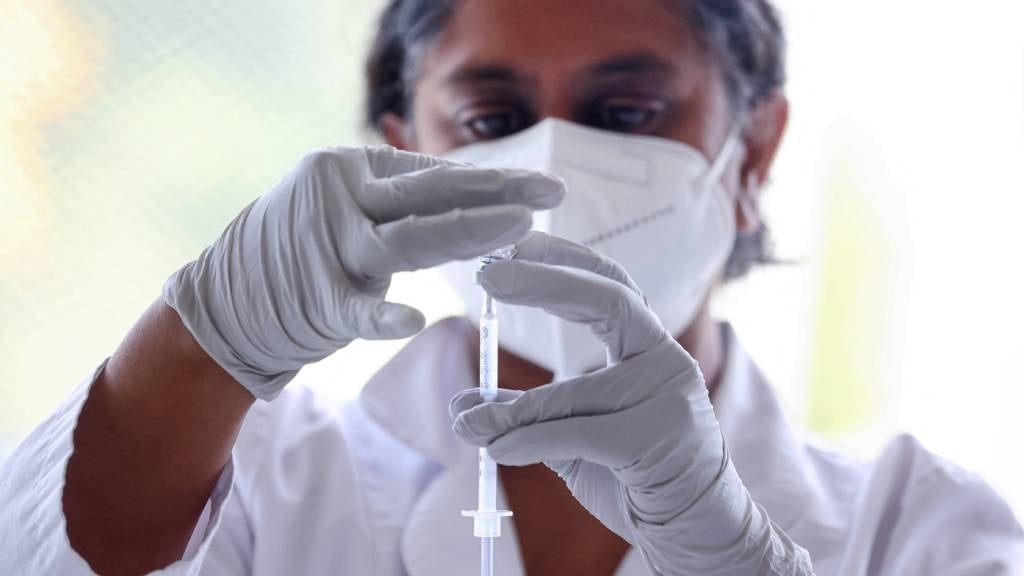A pharmacist demonstrates the preparation of a dose of the mpox vaccine at a pop-up vaccination clinic. (Mario Tama/ Getty Images via AFP)
- The World Health Organisation has declared mpox a global public health emergency.
- The declaration may help unlock vaccinations for Africa.
- South Africa has had more than 20 cases of mpox.
The World Health Organisation (WHO) on Wednesday declared the mpox surge in Africa a global public health emergency, committing to coordinate a global response – which could could help fast track mpox vaccines for the continent.
Infectious diseases specialist Professor Linda-Gail Bekker said the WHO declaration was a way of sourcing vaccinations and other interventions, especially from more developed regions.
“We have none in this part of the world. One way to get the world’s attention is to suggest there’s an outbreak, which potentially puts the rest of the world at risk,” she said.
South Africa has recorded 24 laboratory-confirmed mpox cases and three deaths to date – 12 cases in Gauteng, 11 in Kwazulu-Natal and one in the Western Cape.
There are currently no mpox vaccinations registered for use in the country.
READ | WHO declares mpox in Africa as an international public health emergency
The WHO has been supplying South Africa with an mpox-specific treatment called tecovirimat. News24 understands the medication is being used under a Section 21 application to the South African Health Products Regulatory Authority.
Bekker said while South Africa had reported significantly fewer cases than other countries, there was always risk of the communicable disease spreading across borders.
She added that the outbreak in South Africa appeared to be mainly affecting men who have sex with other men.
“However, we do have to be concerned because we have the largest number of people living with HIV globally. We don’t have everybody living with HIV on antiretroviral treatment or virally suppressed, and we’re seeing severe cases in immunocompromised people,” she said.
Bekker added that there needed to be more advocacy for vaccination and for those vaccines to be made available in Africa.
She said South Africa had been preparing for further outbreaks, and a committee of experts had been established to work with the WHO and the Africa Centres for Disease Control and Prevention (Africa CDC).
She added:
We want to try and nip this in the bud before it becomes an emergency in the country.
The national Department of Health had not commented at the time of publication. Its response will be added once received.
At least 13 African states – including South Africa, Burundi, Kenya, Rwanda and Uganda – have recorded mpox cases in the past two months, forcing the Africa CDC to declare the outbreak a public emergency.
Mpox is mostly endemic to the Democratic Republic of the Congo (DRC), and the majority of cases remain in that country.
There have been 2 863 confirmed cases and 517 deaths in Africa this year, with suspected total cases standing at 17 000.
The Southern Africa Tourism Services Association (Satsa), the voice of inbound tourism in South Africa, said it was concerned by the inaccurate and misleading reporting surrounding the outbreak, which implied the entire continent was equally affected.
ALSO READ | UPDATE: WHO declares mpox’s surge in Africa a global health emergency
“Satsa recognises the need for international cooperation to address the outbreak effectively. However, media narratives that generalise and stigmatise the entire continent do not contribute to resolving the crisis. It is critical to understand that Africa is not a country, but a vast continent [that is] geographically larger than China, the US and Europe combined. Each of its 54 countries has unique environments and health contexts,” said Satsa CEO David Frost.
“Painting the entire continent as a high-risk zone due to a localised outbreak is not only factually wrong, it is damaging to crucial tourism economies across Africa.”
According to Africa CDC, the biggest challenge to combatting the disease is the lack of vaccines. The organisation said the available vaccines could only cover 2% of the affected population.
The situation is made worse by the fact that vaccine trials under way can only produce definite results in four months.
Gavi, the Vaccine Alliance, said it “continues to be deeply concerned about the escalating mpox emergency”.
The emergence of a new clade of #mpox, its rapid spread in eastern #DRC, and the reporting of cases in several neighbouring countries are very worrying.
On top of outbreaks of other mpox clades in DRC and other countries in Africa, it’s clear that a coordinated international… pic.twitter.com/u2DSV6fitj
— Tedros Adhanom Ghebreyesus (@DrTedros) August 14, 2024
“Working in collaboration with countries and partners, Gavi has been closely monitoring the mpox situation since 2022,” the organisation said.
Gavi said mpox had been included in its five-year planning and that it would establish a global stockpile of mpox vaccines – similar to its existing stockpiles for cholera, Ebola, meningitis and yellow fever vaccines.
“Establishment of a stockpile is pending the availability of WHO Emergency Use Listing or prequalification of a recommended vaccine, and subject to fundraising for Gavi’s next strategic period. A critical goal will be ensuring the design of the stockpile is informed by a robust assessment of the long-term public health need,” the organisation said.
“In the interim, Gavi will support outbreak response in the DRC and surrounding countries.”
Gavi has also accelerated engagement with manufacturers for the potential direct procurement of mpox vaccines.

